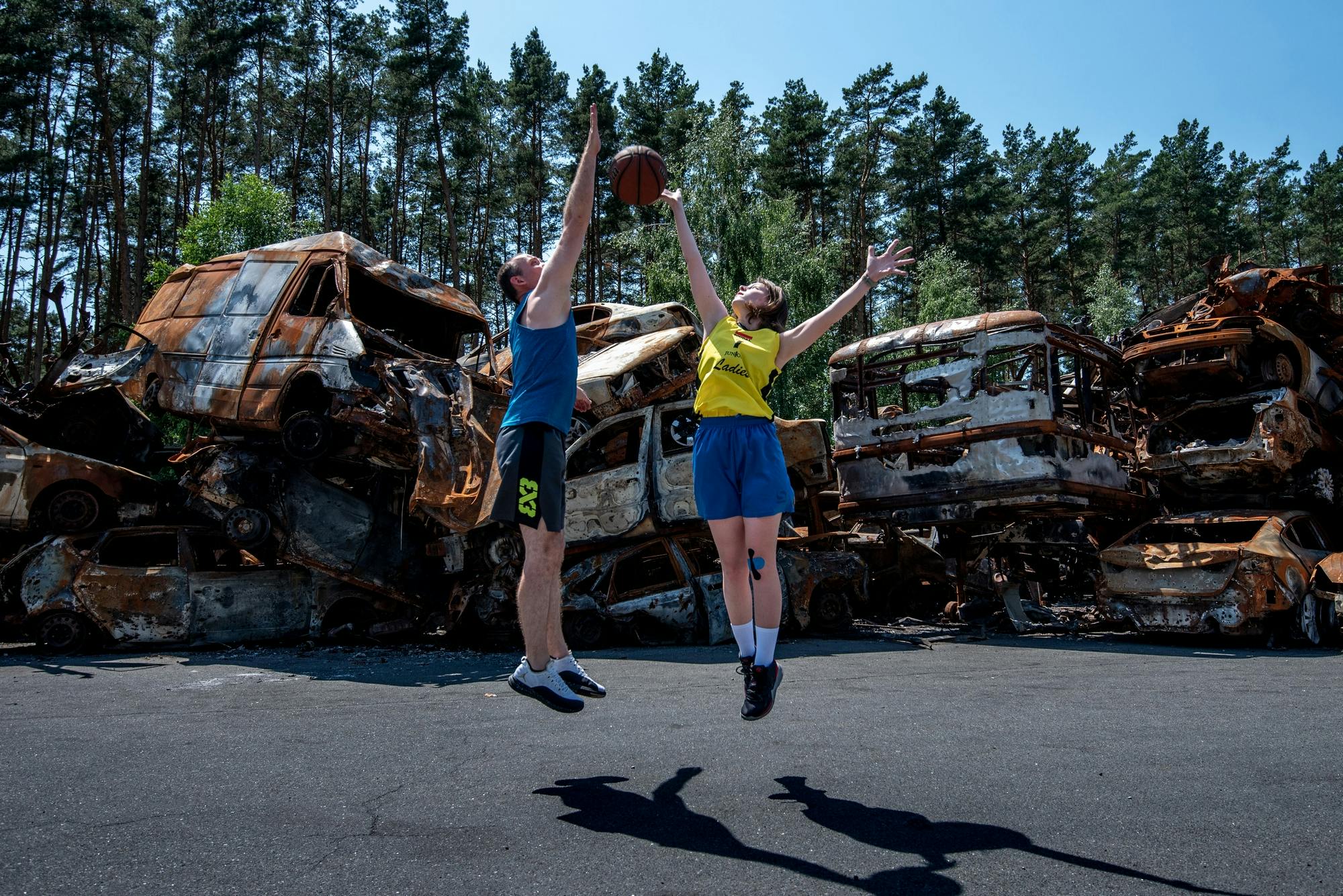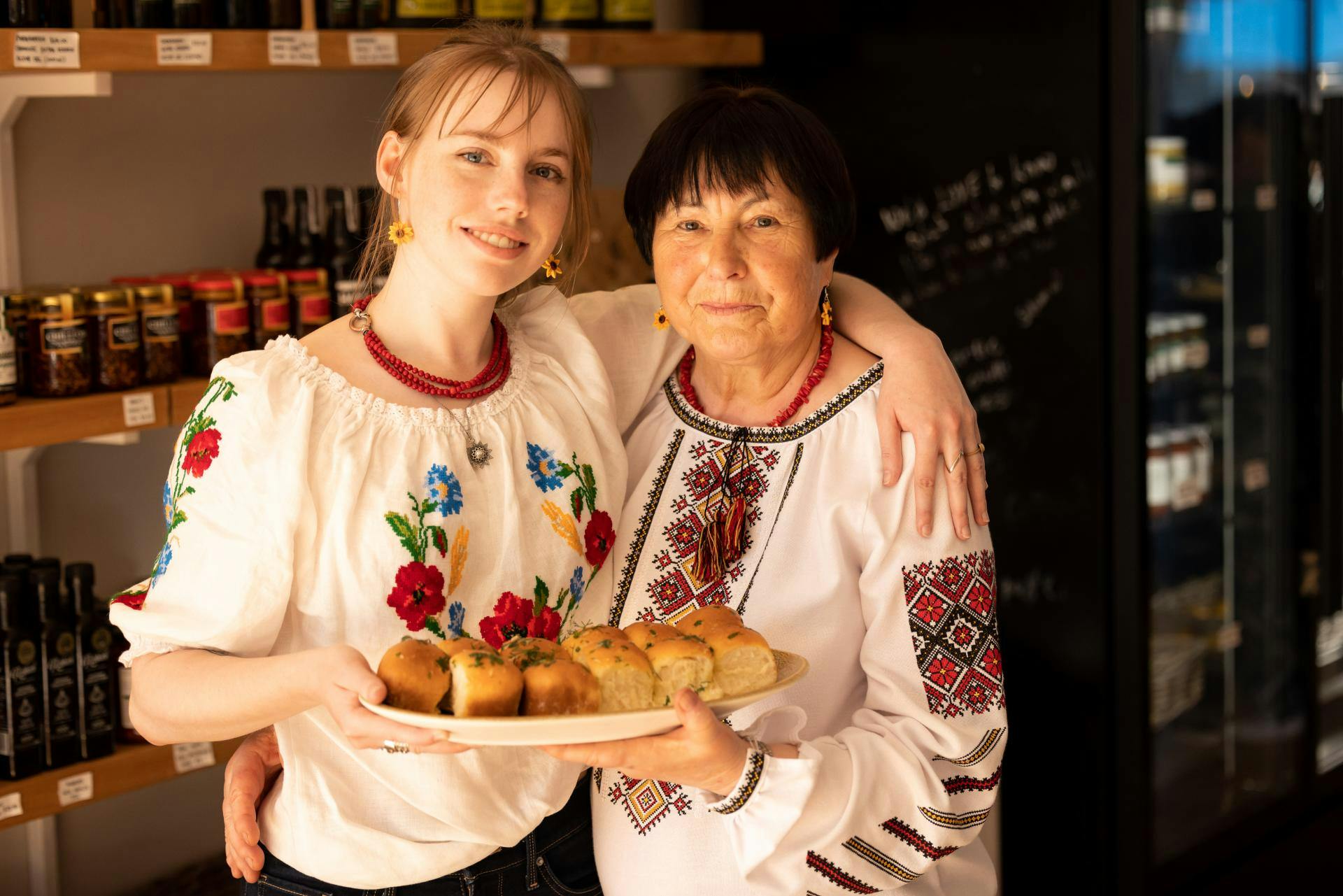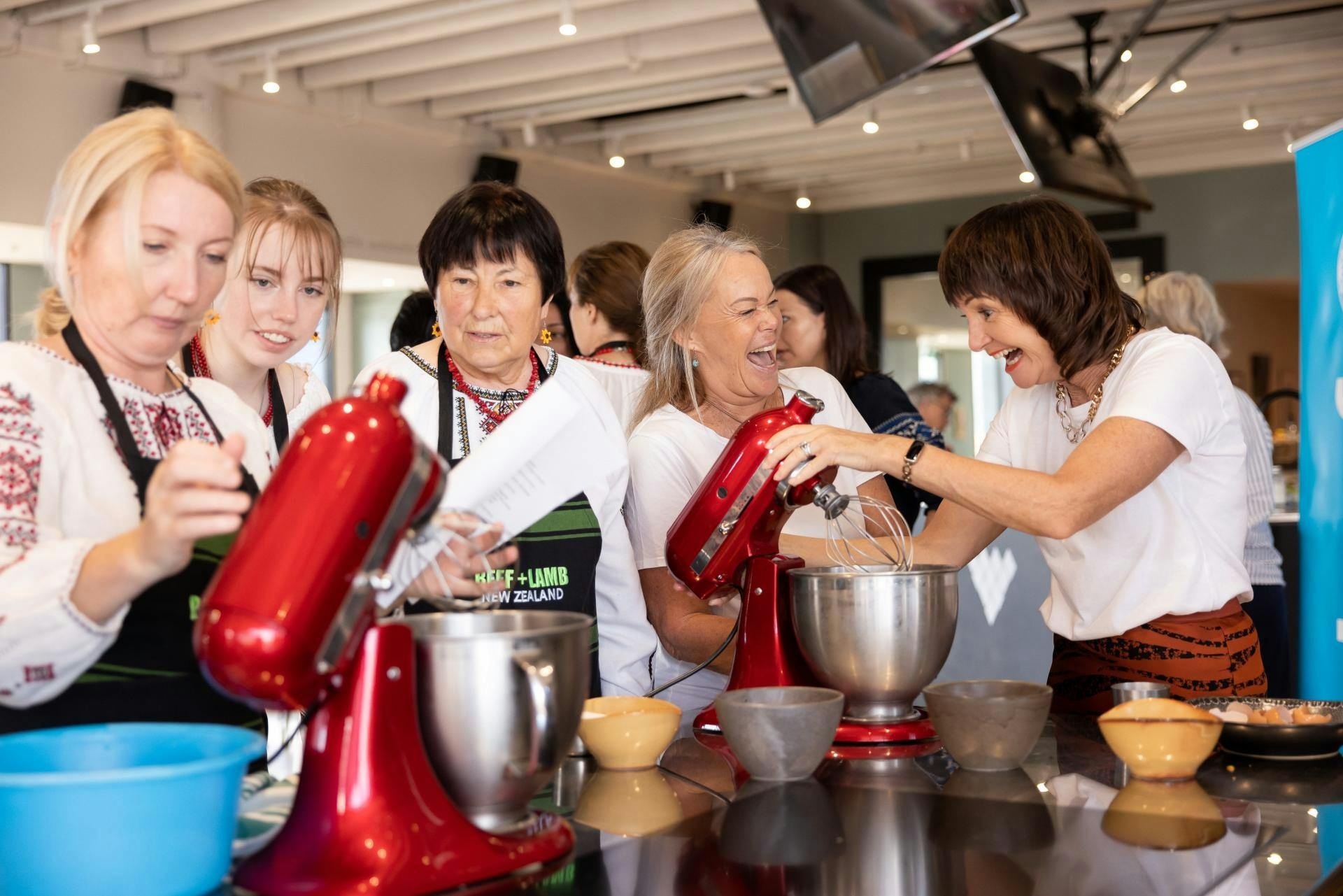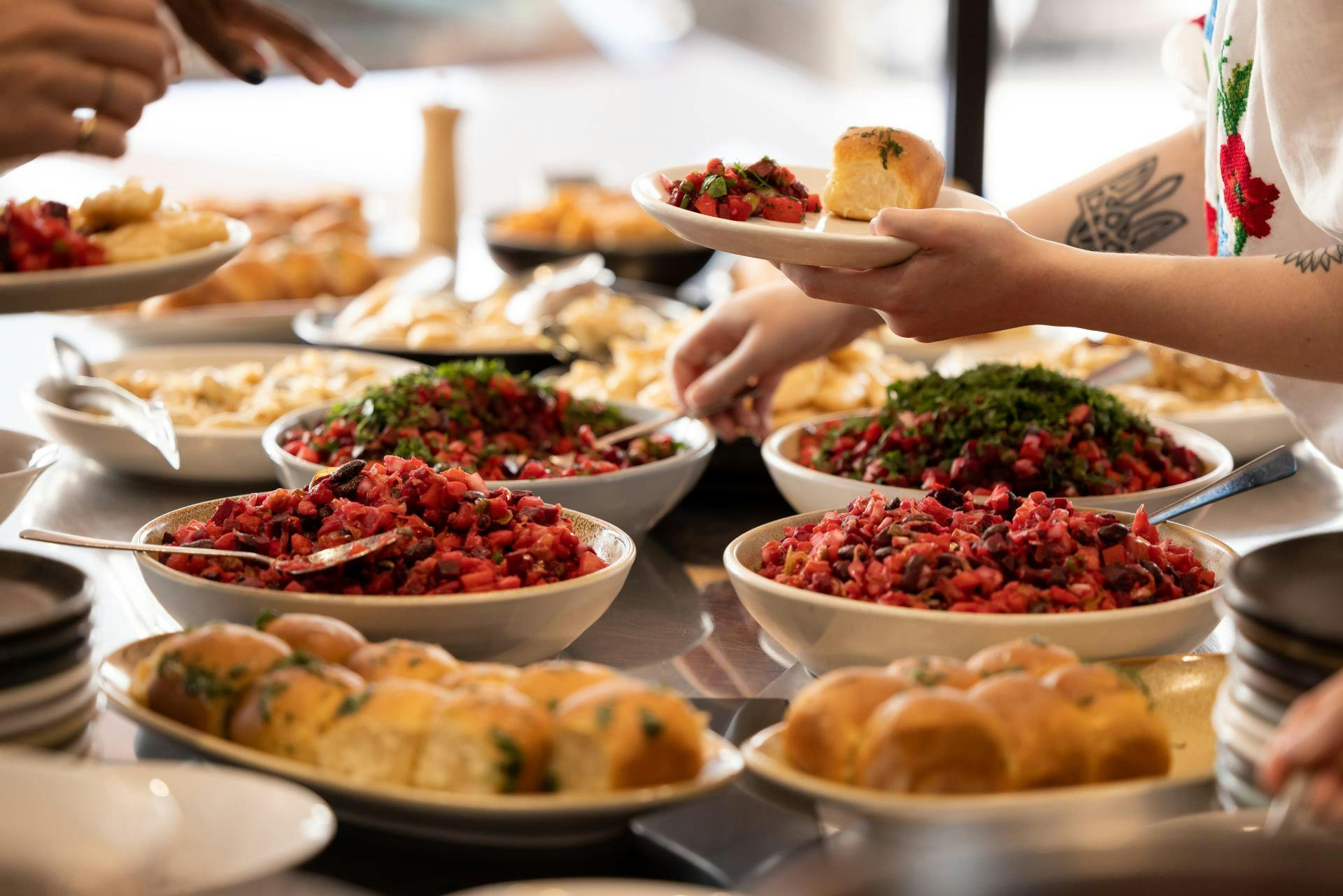
Cooking as an act of
love and resistance
Home
Stories
Cooking as an act of love and resistance
15 months of war in Ukraine, from the other side of the world.
It’s an undeniable fact that cooking traditional food is an act of love but also of cultural preservation, especially in times of war where culture is threatened. For 23-year-old Ukrainian Kiwi, Mar’yana Kozakevych, this has never been more important. Since the war in her ancestral homeland, broke-out, Mar’yana has been showing up for the local Ukrainian community here in Aotearoa. She’s been a part of organizing events and bake sales and her and her grandmother, Kataryna, were guests at our #CookForUkraineNZ launch in April. She’s also part of a co-op called Creative Ukrainians and on a personal level has been creating art and connecting with her grandmother’s traditional cooking.
Mar’yana was just a year old when her parents moved from Ukraine to New Zealand. About a decade later her grandparents, Kataryna and Mykola followed, and much of her youth as a tween and teen were spent in her grandmother’s kitchen listening to stories from home. Her last visit to Ukraine was when she was 8 years old. Memories of Kyiv in the wintertime and the rolling fields of flowers in the countryside during summer, always make her smile. But the thing that she remembers most about this trip was the strong sense of community and love of her extended family, many of whom are currently living through the devastation.

UN0668664
Kyiv today is very different to how Mar'yana remembers it. Stacks of burnt cars along a street where kids play ball.
We sat down with the digital designer and artist who has recently moved back to Tāmaki Makaurau from Wellington to help support her family and the broader Ukrainian community since the war broke out. She shares what it’s been like being so far removed yet so connected to the war.
How has it been for you as someone who grew up in New Zealand, but with Ukrainian heritage?
“It's been difficult to watch everything unfold on a screen, knowing my family connection to certain places and hearing my parents and my grandparents talking about these places that have been badly affected by the war. For a really long time I felt very helpless, like there wasn't much that we can do from this distance. But a pleasant surprise has been how much the local community has come together to raise awareness and aid. I've met so many amazing people in the Ukrainian community here that I'd never met before, who show up to all the events and all the protests. We've stepped up into quite active roles and it’s a really good backbone for support considering what's happening.”
Tell us about your grandmother, Kataryna and your special bond.
“She's lived here for about 10 years now. Her and my grandpa Mykola are both in their 70’s and came here to be closer to my dad. She still calls both New Zealand and Ukraine home. They live quite close to us and since I moved back from Wellington about a year ago she has been loving it because we get to hang out more, like when I was younger. I spent a lot of time with her growing up, she'd be the person who looked after me and my sister after school if my parents were still at work. She's been a really important presence in my life. Her and my grandfather are very good storytellers, so we’ll sit down together, usually over a meal, and they'll tell me stories about our ancestors and the places where we come from. A lot of my knowledge has been shaped by them and they really encourage me to connect with my roots, which is really awesome.”

Mar'yana and her grandmother Kataryna Kozakevych.
How have your Kiwi whānau supported you during this time?
“All my beautiful friends are always checking in with me, which is really cool. I remember when everything began, I got a flood of messages to see if I was okay, if my family was okay. And that was unexpected, but also a really pleasant surprise. Even at work. In my last job, I was shoulder tapped by the managers who I'd never really talked to about it and they were like, ‘oh, let me know if there's anything that I can do, if there's any events coming up that I should know about because we'd really love to support you.’ And that really took me by surprise, the kindness and compassion. There's also the initiatives going on outside of the Ukrainian community, like UNICEF’s #CookforUkraineNZ fundraiser, which is incredible to see.”
How's it been for your grandparents?
“Short answer, once again, very hard. They've been keeping in touch with their extended family there, mainly their siblings and it's tough that they can't be there with them but they also feel very grateful that they are in a safe and supportive place like New Zealand. Even before the war, they've always been amazed at how kind and welcoming New Zealanders are. Their English isn’t great but since the war broke out they’ve found it so heart-warming that people still take the time to engage with them about it and have the patience for listening through their broken English. It makes them feel like they're not alone in this, like there's people here supporting us and rooting for our family back home in Ukraine. It’s been something that they’ve commented on multiple times.”

Mar'yana and Kataryna at the #CookForUkraineNZ launch
Tell us about Ukrainian cooking. How would you describe it?
“So I describe Ukrainian cooking as delicious, and also very homely; lots of potatoes and grains, soups and bread with everything. It’s also really interesting in the way that it's quite diverse. There's a lot of dishes in Ukraine that come from other ethnic groups that live in that area. For example, one of my favourite dishes is Crimean Tatar Chebureki. It comes from Crimea and it's deep-fried meat turnovers. My grandma makes them quite regularly, at my request. I’ll never get sick of those.”

Tastes and flavours of Ukraine
“Well, firstly I'd like to say a huge thank you to everyone from across Aotearoa who’s signed up for the fundraiser. We see your support, it means so much and it makes a big difference. I really hope you enjoy the food and the recipes and share it with, your whānau and friends.”
UNICEF Aotearoa’s #CookForUkraineNZ campaign is an initiative to show support for New Zealand’s Ukrainian community as well as to support our emergency relief for the children in Ukraine. The cooking, sharing and eating of traditional food is not only a meaningful way to bring friends and whanau together, but it’s also a way to preserve and support the distinct cultural heritage of the Ukrainian people, which is being threatened by the ongoing war. All proceeds from the campaign #CookForUkraineNZ go towards providing essential life-saving supplies and resources to Ukrainian children and their families affected by the war. Sign up to host your own #CookForUkraineNZ fundraiser here.